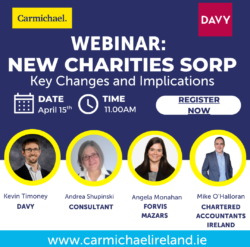Target Audience
Managers and staff of charities and not-for-profits.
Outline
This training course is designed to engage non-technical management and staff of charities and non-profits, helping them understand the importance of Business Continuity Planning (BCP) with IT Disaster Recovery (ITDRP). These are also referred to as Business Resilience Planning in other sectors.
This planning is essential in safeguarding organisations from wide ranging, catastrophic events which would have a significant impact on the continuing operation of charities and non-profits. The topics are presented in a practical and accessible manner so the attendees would have the ability to put in place the requisite plans to handle a crisis event, cyber security related or otherwise.
1) Introduction
a) What is Business Continuity Planning?
b) The elements of continuity planning:
-
- Business Impact Analysis (BIA)
- Business Continuity Plan (BCP)
- IT Disaster Recovery Plan (ITDRP)
c) Why are these important for charities?
d) Common risks for charities
e) The benefits of having business continuity and IT disaster recovery plans
2) Planning for Continuity
a) Identifying your organisation’s critical functions
b) Analysing the risks to these critical functions using an BIA
c) Developing business continuity and IT disaster recovery plans from the BIA
d) Best practices for testing your plans
3) Responding to Crises
a) Activating your business continuity and IT disaster recovery plans
b) Managing the crisis
c) Communicating with stakeholders during a crisis
d) Recovering from the crisis
Methodology
Delivered virtually via Google Meet. It will be an interactive workshop, including a breakout room for participants to see how they would assess their own risks and then plan for that scenario. A copy of the slides will be provided as well as a link to download templates for Business Impact Analysis (BIA), Business Continuity Plan (BCP) and IT Disaster Recovery Plan (ITDRP).
Target Audience
New Board Members, Directors, Charity Trustees of non-profit organisations.
Outline
A comprehensive induction is an important first step in ensuring that new Board Members, Directors and Charity Trustees have the understanding needed to carry out their roles, responsibilities and obligations effectively. This workshop aims to form part of that induction process.
Below is an outline of the topics covered:
- Governance Overview
- Board Members’ Roles and Responsibilities
- The Chairperson
- Board Relationship with CEO/Staff
- Company Limited by Guarantee – Directors
- Charity – Charity Trustees
- What more to expect from a Board Induction
Methodology
Delivered virtually via Zoom.
Target Audience
The Treasurer has an important role in an organisation. An effective treasurer contributes to a successful organisation and is essential to Community, Voluntary or Charitable Organisations fulfilling their responsibility to manage their money and other resources properly. This workshop is for anyone who is a Treasurer or may be thinking of taking up office as a Treasurer and anyone looking to appoint or recruit a treasurer.
Outline
The main areas covered will be:
- Main responsibilities and duties of a treasurer
- Characteristics of a good treasurer
- Useful skills for a treasurer
- Tips for being an effective treasurer
- Pit falls to avoid
- Basic rules of dealing with money
- How the Treasurer fits into the management committee or Board
- Accountability
The workshop will include discussions and practical examples of how to carry out the duties of a treasurer and good practice
Methodology
Delivered virtually via Zoom.
Target Audience
Individuals or organisations interested/involved in setting up and running a small non-profit organisation, or supporting others doing the same.
Outline
This online course will be delivered over 2 weekly Zoom sessions as per the details below. For privacy reasons, these sessions will not be recorded, so please make sure to attend both sessions if possible.
Module 1: (Tues 1st July, 10am – 1pm)
Establishment of a Group
- Setting up a community group
- Deciding on the Legal Structure
- Writing Your Constitution
- Recruiting Volunteers
Running of the Group
- Committee Roles
- Running a Meeting
- Agendas/Minutes
Module 2: (Tues 8th July, 10am – 1pm)
Making Decisions
- Conflict of Interest
- Code of Conduct
- Communication with members of group
Legal Duties
- Regulatory Responsibilities
- Charity/Tax & Bank Accounts
- Succession Planning
Methodology
Delivered virtually via Zoom.
Target Audience
Anyone wishing to pick up some productivity tips in the use of MS Word, Excel, PowerPoint, Outlook and OneNote. Prior knowledge of Microsoft Office/Microsoft 365 is essential.
Outline
In this course you will learn productivity tips from the following Microsoft programs:
Outlook
- Cleaning up your inbox
- Scheduling emails in advance
- Creating simple rules
- Using quick parts
Word
- Working with styles
- Contents pages
- Cover pages
- Watermarks
Excel
- Cleaning data
- Separating text from within a cell
- Locking cells
- Displaying data visually
PowerPoint
- Using slides from another presentation
- Changing fonts throughout the entire presentation
- Working with images and shapes
- Using the presenter view
Methodology
Delivered via Microsoft Teams. This session will be recorded and the recording will be circulated to participants on completion.
Target Audience
Board Members, Chairpersons and CEOs of non-profit organisations.
Outline
- Roles and responsibilities – Board, CEO, Chair
- Communication between CEO and Chair (Board)
- HR sub-committee (CEO Selection, Review, Remuneration, Succession Planning)
- CEO role in relation to the Board
- CEO performance appraisals – how to conduct appropriately
- Board only sessions
- Board evaluation (its value and purpose)
- Success factors for effective relationships
- Common problems/pitfalls with relationships and boundaries
- Culture / code of conduct / differences of opinion / behaviour
Methodology
Delivered virtually via Zoom.
Target Audience
Are you a Board member of a voluntary or community group? Are you unsure of what is expected of you? Do you want to ensure your organisation is governed in accordance with good practice?
Outline
This session will demystify Board members’ roles and responsibilities and give you tools to enhance your contribution and the effectiveness of your Board. It outlines the purpose of the board as a whole in relation to governance and management. We then examine the specific roles of individual board members and in particular, their legal responsibilities and duties under the Charities Act (2009) and the Companies Act (2014). The workshop will finish with a discussion on typical problems arising within boards and some practical solutions to deal with them.
Methodology
Delivered virtually via Zoom.
Target Audience
Trustees, Chairs, CEOs, and those responsible for governance in their Charity.
Outline
The Charities Governance Code explains the minimum standards you should meet to effectively manage and control your charity. This workshop will walk you through the requirements of the code including actions and evidence needed to demonstrate compliance.
Methodology
Delivered virtually via Zoom.
Target Audience
CEOs, senior managers or staff from non-profits/charities who’d like to learn how to improve their Microsoft PowerPoint presentations. Prior experience of using Microsoft PPT is essential.
Outline
- Slide Theory – what to think about before opening PowerPoint
- PowerPoint Fundamentals – time-saving tools to help you create professional slides
- Present with Confidence – tools to help you feel in control when you deliver your presentation
Methodology
Delivered via Microsoft Teams.
Target Audience
Are you passionate about protecting adults at risk in your community? Do you want to learn how to recognise and respond to abuse effectively?
The aim of this workshop is to enable the learner to understand:
- The principles of safeguarding.
- The indicators of abuse.
- The roles, responsibilities, and actions a person should take in safeguarding adults at risk of abuse.
- Learn about newly introduced legislation.
Outline
- Find out about Safeguarding and your obligations to it.
- Learn about the 6 Principles of Safeguarding.
- Discover how to identify adults in your organisation or community who may be at risk.
- Learn about recognising the signs of abuse.
- Learn how to Report Concerns and Respond to Allegations.
- Introduction to the newly launched “Assisted Decision Making (Capacity) Act 2015”.
- How to develop a Safeguarding Culture.
Methodology
Delivered virtually via Zoom.



